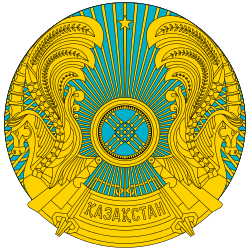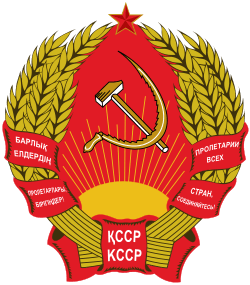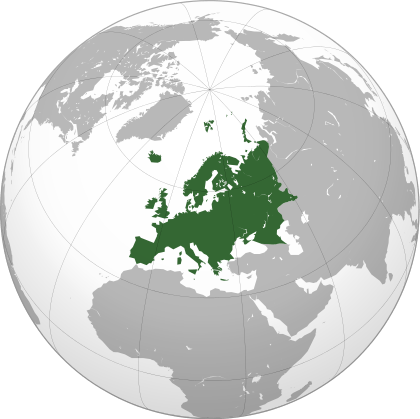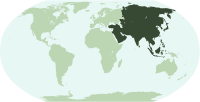Emblem of Kazakhstan
| Emblem of Kazakhstan | |
|---|---|
 | |
| Details | |
| Armiger | Republic of Kazakhstan |
| Adopted | 4 June 1992 |
| Crest | Pentagonal star |
| Escutcheon | Kazakh: Шаңырақ |
| Supporters | Tulpar |
| Motto | ҚA3AҚCTAH |
| Earlier versions |
 |
| Use | The coat of arms of Kazakh Soviet Socialist Republic from 1937 to 1991. Until 1978, the hammer was placed over the sickle. |
The emblem of Kazakhstan (Kazakh: Қазақстан елтаңбасы Qazaqstan eltañbası) was adopted on June 4, 1992. The authors of the emblem are Jandarbek Melibekov and Shota Walikhanov. About 245 projects and 67 description designs of the future arms took part in the final competition.[1] Like other post-Soviet republics whose symbols do not predate the October Revolution, the current emblem retains some components of the Soviet one, in this case, rising sun rays and star. Prior to 1992, Kazakhstan had a coat of arms similar to all other Soviet Republics.
Overview
The emblem is an image of shanyrak (Kazakh: Шаңырақ, şañıraq; more often seen in the Russian transcription, Шанырак, shanyrak), the upper dome-like portion of a yurt, against a sky blue background which irradiates (in the form of sun rays) uyks (supports) set off by wings of mythical horses, inspired by Tulpar.[2] The circle shape of the Emblem is a symbol of a life and eternity. The shanyrak symbolizes well-being of family, peace and calmness.
A design very similar to the Kazakh shangyraq is used in the flag of the neighboring Kyrgyzstan; it is known as tunduk in Kyrgyz.
The colour version of the national emblem of the Republic of Kazakhstan consists of two colours: gold and sky blue. The golden colour corresponds to a light, clear future of Kazakh people, and the blue sky colour is a symbol of aspiration to the peace, consent, friendship and unity with all people.[3]
The name of the country in Kazakh, ҚA3AҚCTAH (QAZAQSTAN), is in the lower part of the coat of arms.
See also
References
External links
| Wikimedia Commons has media related to Coats of arms of Kazakhstan. |

